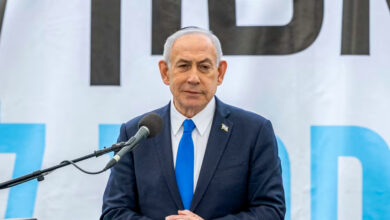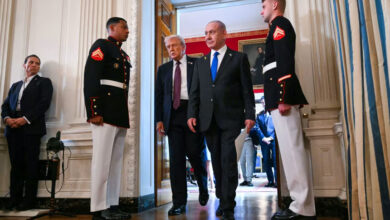Gaza's Hamas Islamist rulers released captured Israeli soldier Gilad Shalit on Tuesday in return for hundreds of Palestinian prisoners, a Hamas military source said, in a deal ending a saga that has gripped Israel for five years.
The source said Shalit, 25, was taken across the frontier from the Gaza Strip into Egypt's Sinai peninsula, where he was handed over to Egyptian officials who will take him to Israel's Vineyard of Peace border crossing a short distance away down a desert road.
There was no immediate confirmation from Israel or Egypt.
Israel was to release 477 Palestinian prisoners during the day. Some were due to be taken to the Sinai and handed over to Egyptian officials for transfer to the Gaza Strip, which is run by Hamas. Other were to go free in the occupied West Bank.
Some 40 are being sent into exile to Turkey, Qatar and Syria. Another 550 Palestinians are to be released in a second stage of the Egyptian-brokered agreement, expected in about two months.
The mood in Israel was one of joy. Shalit has been popularly portrayed as "everyone's son" and opinion polls showed that an overwhelming majority of Israeli backed the thousand-for-one deal, although many of the prisoners going free were convicted of deadly attacks.
For Palestinians, it was a time to celebrate what Hamas hailed as a victory, and a heroes' welcome awaited the released prisoners. Palestinians see brethren jailed by Israel as prisoners of war in a struggle for statehood.
The deal received a green light from Israel's Supreme Court late on Monday after it rejected petitions from the public to prevent the mass release of prisoners, many serving life sentences for deadly attacks.
Shalit was abducted in June 2006 by militants who tunneled into Israel from the Gaza Strip and surprised his tank crew, killing two of his comrades. He has since been held incommunicado and was last seen looking pale and thin in a 2009 video shot by his captors.
On reaching Israel, Shalit will be flown by helicopter to an air base in the center of the country where he will be greeted by Prime Minister Benjamin Netanyahu and reunited with his family. Later he will fly to his home in northern Israel.
High price
The repatriation of captured soldiers, alive or dead, has long been an emotionally charged issue for Israelis. Many have served in the military as conscripts and see it as sacrosanct. But they also feel stung by the high price they feel Israel is paying for Shalit.
"I understand the difficulty in accepting that the vile people who committed the heinous crimes against your loved ones will not pay the full price they deserve," Netanyahu wrote in a letter, released by his office, to bereaved Israeli families.
Israel, which withdrew troops and settlers from Gaza in 2005, tightened its blockade of the coastal territory after Shalit was seized and taken there.
The deal with Hamas, a group classified by the United States and European Union as a terrorist organization over its refusal to recognize Israel and renounce violence, is not expected to have a direct impact on efforts to revive Middle East peace talks.
Palestinian President Mahmoud Abbas, a Hamas rival, has been pursuing UN recognition of Palestinian statehood in the absence of negotiations with Israel that collapsed 13 months ago in a dispute over settlement-building in the occupied West Bank.
Crowds gathered in both Gaza and the West Bank awaiting the return of their prisoners.
"This is the greatest joy for the Palestinian people," said Azzia al-Qawasmeh, awaiting at a West Bank checkpoint for her son Amer, who she said had been in prison for 24 years.




